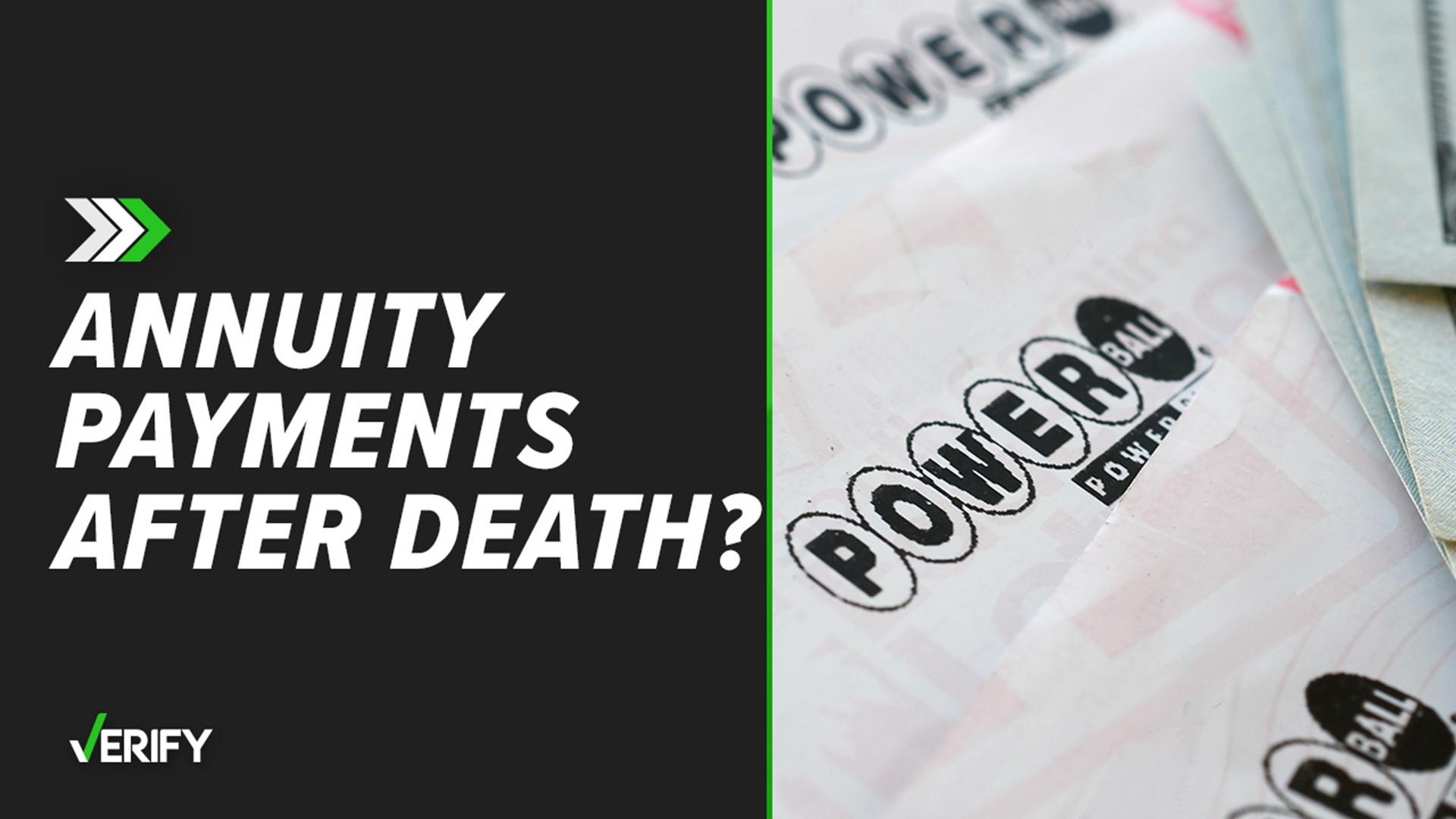Powerball, one of the major nationwide lotteries, becomes a national sensation every time its jackpot balloons to over $1 billion. But whenever someone finally wins, they end up with two options: the full jackpot paid out over 30 years, or a lump sum that's much smaller than the advertised jackpot.
Since people only get the full prize if they take the payments over 30 years, that option may be appealing to some. But 30 years is a long time, and anything can happen.
VERIFY reader Cheri asked, “So what happens if you pass away before the 29 years are up?”
THE QUESTION
Does the lottery stop making annuity payments if a jackpot winner dies before the full prize is paid out?
THE SOURCES
THE ANSWER
No, the lottery does not stop making annuity payments if a jackpot winner dies before the full prize is paid out. The remaining prize money will go to the winner’s estate or named beneficiaries.
WHAT WE FOUND
Simply put, a jackpot winner’s prize is treated the same way as the rest of their money and property, regardless if the winner collected their prize in a lump sum or as annual payments.
Powerball explains this on its frequently asked questions page.
“If a jackpot winner dies before receiving all annual installments, the balance of the prize will be paid to the winner's estate,” Powerball says. “Upon receipt of a court order, annual prize payments will continue to be paid to the winner's heirs. Other provisions may also apply depending on the laws of the lottery paying the prize.”
A person’s “estate” is the property the person owned when they died, the Judicial Branch of California says. The process of determining who gets to inherit that property is determined by state law and the decedent’s trust, if they have one.
That means that state law also determines how the winner’s prize is transferred to their estate, and what options the winner’s heirs have when inheriting that prize.
More from VERIFY: No, the $2.04B Powerball “jackpot” isn’t the cash prize — it’s an estimate for annuity payments
One such option is that the annual payments will simply continue as before, except they will be redirected to the person’s estate or named beneficiaries.
“If a winner dies before receiving all annual payments, payments will continue, as scheduled, to the winner's designated beneficiary or to the winner's estate,” says the Colorado Lottery.
But estate tax hits all at once, according to personal finance information site Sapling. Since the winner’s entire prize is included in the estate, even if that prize only comes in installments through annual payments, it’s possible for the estate tax on the prize winnings to be higher than the total annual payments for a few years.
Because of that, many states give beneficiaries the option to inherit the annual payments as a single lump sum.
“Some lotteries will cash out an annuity prize for an estate, to make it easier for the estate to distribute the inheritance and to pay federal estate taxes when they apply,” says Annuity.org, an annuity educational resource for consumers. “In order for the lottery to do this, it has to be allowed in the state where the ticket was purchased.”
For example, the North Dakota Lottery says that the Multi-State Lottery Association (MUSL), which is the association of American state and territorial lotteries that run Powerball, “may accelerate the payment of all of the remaining proceeds to the player's estate” at its discretion.
Still, other lotteries make it clear that the choice is up to the estate itself.
“By law, the remaining installment payments become part of the winner's estate in the event his/her death precludes collecting full payment,” the state of Washington’s Lottery says. “The winner's estate has the option, in most cases, of continuing to receive annual payments or requesting that the Lottery Director allow a one-time payment of the current cash value of the remaining winnings.”
More from VERIFY: Only some states collect taxes from Powerball winnings

